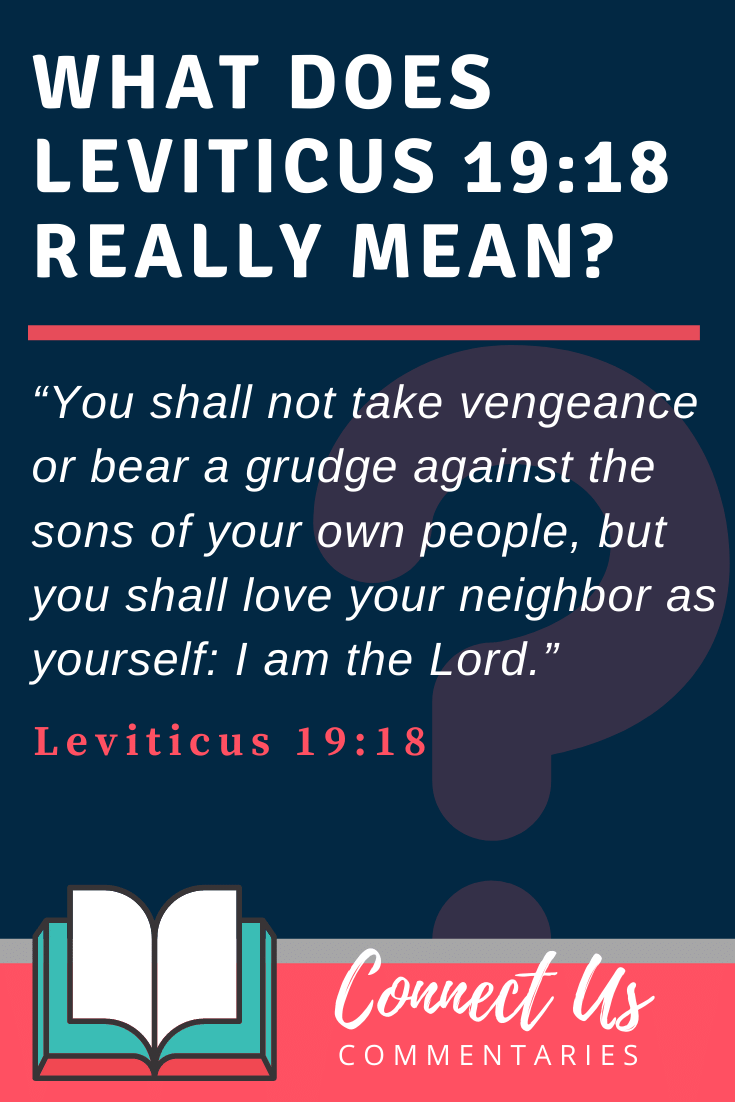Leviticus 19:18
“You shall not take vengeance or bear a grudge against the sons of your own people, but you shall love your neighbor as yourself: I am the Lord.”
Explanation and Commentary of Leviticus 19:18
Contrary to what unbelieving critics of Christianity may say, God’s character is consistent in Scripture from start to finish. His desire here in Leviticus, a book hated by the unbelieving world, is that men and women would love their neighbor as themselves. Jesus did not invent this concept in the first century, but it was always the heart of God for mankind. Here, God is focused on the Jewish person’s attitude toward his fellow Jew, his “own people,” but we know that God means us to treat all people in the same way.
The bearing of a grudge is a disaster on one’s own heart and soul. Men and women are simply not meant to carry that sort of hatred without it killing us from the inside. God, who is perfect and merciful, will be the one to right the wrongs against us. It is not that we as his agents are not called to exact justice as vested authorities from God, such as when the state carries out the rule of law in just and fair ways, but to hold a grudge is to hold onto hatred, and God will not have it in his people.
Rather, we must love our neighbor as our very selves. Some might say, “But I hate myself.” On the contrary, one cannot hate him or herself unless one truly loves oneself enough to care to hate. Everyone loves themselves, but most, especially apart from God, have a dysfunctional relationship with themselves. Nevertheless, we are called to love others. Love, especially for those who have hurt us, sets us free from the agony of hatred and anger and gives them over to the justice of God.
Breaking Down the Key Parts of Leviticus 19:18
#1 “You shall not take vengeance…”
When we are hurt, we are not to pay back to our abuser. Justice may need to be done by getting God’s agent, the state, involved, but we are to be free from the job of vengeance.
#2 “…or bear a grudge…”
God’s concern is never simply about our actions, but also our hearts. Jesus would make this crystal clear in his teaching, especially in the Sermon on the Mount (Mt 5-7). We must let go of our anger and release it to God.
#3 “…against the sons of your own people,”
For us, this means against our brothers and sisters in the Church, but Jesus even expanded the meaning of our “own people” to include all humans.
#4 “but you shall love your neighbor as yourself:”
The absence of grudges and hatred will not be indifference, but love. This is a powerful and Christlike way to live and be.
#5 “I am the Lord.”
To set these words in concrete, God reminds us who is making this command, and why he has the authority to make it and to expect us to obey. We need no other explanation.
Expert Overview of Leviticus
Biblical Translations of Leviticus 19:18
NIV
“Do not seek revenge or bear a grudge against anyone among your people, but love your neighbor as yourself. I am the Lord.”
NLT
“Do not seek revenge or bear a grudge against a fellow Israelite, but love your neighbor as yourself. I am the Lord.”
ESV
“You shall not take vengeance or bear a grudge against the sons of your own people, but you shall love your neighbor as yourself: I am the Lord.”
KJV
“Thou shalt not avenge, nor bear any grudge against the children of thy people, but thou shalt love thy neighbour as thyself: I am the Lord.”
NKJV
“You shall not take vengeance, nor bear any grudge against the children of your people, but you shall love your neighbor as yourself: I am the Lord.”

Natalie Regoli is a child of God, devoted wife, and mother of two boys. She has a Master's Degree in Law from The University of Texas. Natalie has been published in several national journals and has been practicing law for 18 years.